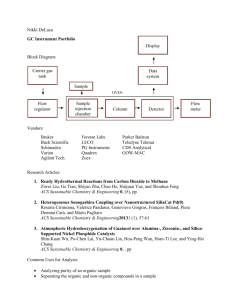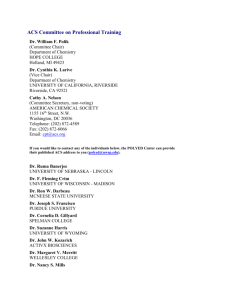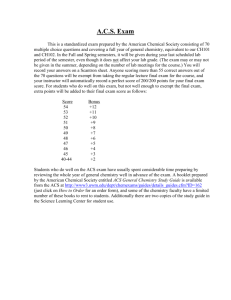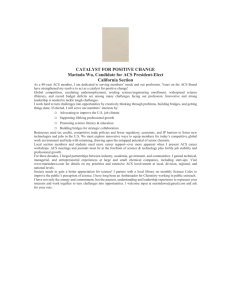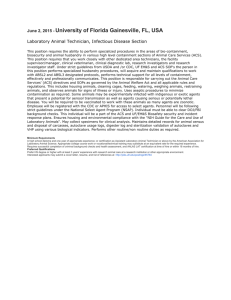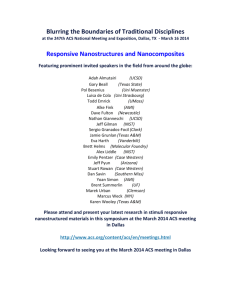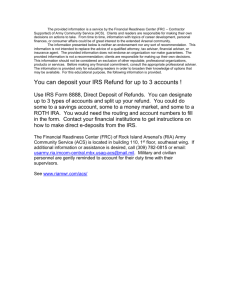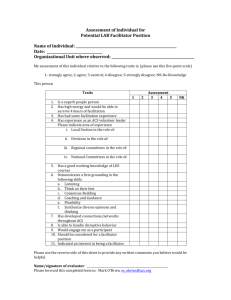Presentation Slides - American Chemical Society
advertisement
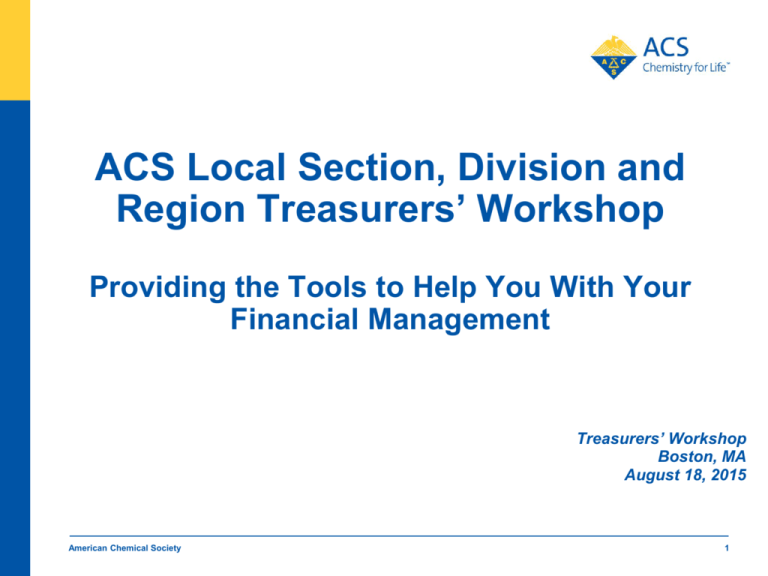
ACS Local Section, Division and Region Treasurers’ Workshop Providing the Tools to Help You With Your Financial Management Treasurers’ Workshop Boston, MA August 18, 2015 American Chemical Society 1 Objectives • Define your role as Treasurer • Preparing for Compliance With the IRS • Budgeting • Incorporate or Not • Your Questions • Resources American Chemical Society 2 You are THE Treasurer • The Financial Officer • FORMS – Annual Report submission – Bylaw requirement – Facilitates the allotment disbursement – Assists the Committee on Divisional Activities(DAC) and the Local Section Activities Committee (LSAC) with assessing the health and vitality of divisions and sections American Chemical Society 3 Responsibilities • Retain accurate and proper records – Bank records, invoices, receipts • Maintain a book of accounts (ledger) showing the details of all revenues and expenses • Manage Bank accounts • Maintain records of all investments • Keep the executive committee informed of all financial matters • File appropriate IRS forms and provide ACS with a copy • Review the section’s or division’s Bylaws to determine if there are other duties required by the section or division American Chemical Society 4 Questions • FORMS questions can be sent to forms@acs.org • Additional Resources available online at: www.acs.org/getinvolved American Chemical Society 5 ACS Local Section, Division and Region Treasurers’ Workshop Preparing for Compliance with IRS Requirements Treasurers’ Workshop Boston, Massachusetts August 18, 2015 American Chemical Society 6 Navigating the Tax Compliance Reporting Requirements for Tax Exempt Organizations. American Chemical Society 7 Objectives • Provide information regarding the ACS and affiliated organizations’ tax-exempt status • Identify benefits of tax-exempt status • Identify actions that jeopardize tax-exempt status • Review mandatory federal tax filings • Identify other requirements (public inspection, public support test, acknowledging donors) • Identify other topics affecting tax-exempt organizations (awards, scholarships, fellowship grants) American Chemical Society 8 ACS Basic Organization Information • Type of exempt organization: Charitable non-profit scientific and educational organization • Exempt under IRC Section 501(c)(3) • Non-private foundation under IRC Section 509(a)(2) Public Charity – Meets Public Support Test • more than 33 1/3% of support come from contributions, membership fees, and gross receipts from activities related to exempt functions, and • Not more than 33 1/3 % of support come from gross investment income • IRS determination letter issued on February 4, 2003 American Chemical Society 9 Tax-Exempt Status of ACS Affiliated Organizations • ACS affiliated organizations include: – Local Sections, Divisions, Subdivisions, and Regions • Type of exempt organization: Charitable non-profit scientific and educational organizations • Exempt under IRC Section 501(c)(3) through ACS Group Exemption Letter (if election is made by organization) – IRS Group Exemption Determination Letter (most recent issued February 4, 2003) • Exempt from federal income tax (generally) • Non-private foundation under IRC Section 509(a)(2) Public Charity American Chemical Society 10 What is the ACS Group Exemption? • IRS granted exemption to ACS affiliated organizations through the ACS Group Exemption Letter – ACS is the central organization – Group exemption number: 0945 – ACS must take measures annually to keep group exemption letter in force – Re-election to be included under ACS group exemption must be made every year. – New local sections, divisions, regions, subdivisions can obtain tax-exempt status by electing to be included within the ACS group exemption letter – A benefit of being under the ACS group exemption is the cost and time savings from not having to file a separate tax-exempt application with the IRS. American Chemical Society 11 What is the ACS Group Exemption? (cont.) • Affiliated Organizations (Local Sections, Divisions, Subdivisions, Regions) – ACS does not have operational and financial control – Affiliated organizations are separate legal entities • Each has their own federal employer identification number (FEIN/EIN); (also called taxpayer identification (TIN), or federal id number • DO NOT USE THE ACS FEDERAL ID NUMBER • If you do not know your FEIN, contact the ACS Tax Office – Each one must prepare their own individual/separate financial reporting and tax filings to maintain tax-exempt status – Each one must maintain non-private foundation status by meeting public support test American Chemical Society 12 Benefits of 501(c)(3) Status • Income from exempt purpose related activities are exempt from federal income tax • Exempt from federal unemployment taxes • Exempt from some state taxes (e.g., income, sales, employment) • Contributions received are tax deductible to donors • Tax-exempt financing available • Reduced postal rates available American Chemical Society 13 What Jeopardizes § 501(c)(3) Status? • FAILING TO MEET FILING REQUIREMENTS • Inurement/private benefit activities prohibited and restricted • Lobbying activities must be insubstantial • Political activities are absolutely prohibited • Failing to operate with an exempt purpose • Unrelated business activities must not be the primary purpose – Exempt purpose is found in organization’s organizing documents such as Articles of Incorporation, Articles of Association, Constitution, or Bylaws American Chemical Society 14 Federal Tax Filing Requirements • Information returns (Form 990 series): – Form 990 - Return of Organization Exempt from Income Tax – Form 990-EZ - Short Form Return of Organization Exempt from Income Tax – Form 990-N e-Postcard • Income tax return: – Form 990-T – Exempt Organization Business Income Tax Return (if you have unrelated business income (UBI)) • Other information returns: – Form 1099 MISC - Miscellaneous Income – Form1096 - Annual Summary and Transmittal of U.S. Information Returns American Chemical Society 15 WHICH FORM 990 TO FILE? American Chemical Society 16 Which Form 990 to File? Based on Gross Receipts and Total Assets Form to File Gross receipts normally ≤ $50,000** Gross receipts > $50,000 AND < $200,000, AND Total assets < $500,000 Gross receipts ≥ $200,000, OR Total assets ≥ $500,000 990-N (e-Postcard) 990-EZ 990 ** To determine if gross receipts are normally ≤ $50,000: Take the average gross receipts based on a 3-yr period to include tax year + 2 prior tax periods The Form 990 series of returns (Form 990, 990-EZ, or 990-N) are mandatory for 501(c)(3) organizations American Chemical Society 17 Federal Tax Filing Requirements Form 990 - Gross Receipts What are gross receipts? 1. Contributions 2. Program Service Revenue 3. Membership Dues & Assessments (includes ACS Allotments to Divisions and Local Sections) 4. Interest - Savings/Temporary Investments 6. Gross rents 7. Other Investment Income 8. Sale of Assets (Not Inventory) 9. Special Events 10. Gross Sales of Inventory 11. Other Revenue 5. Dividends & Interest-Securities American Chemical Society `18 Calculating your Gross Receipts ABC Local Section has the following items of Gross Receipts. Which Form 990 should they file for tax year 2015? Gross Receipts 2013 2014 Contributions $25,000 Membership Dues Misc. Sales Total 2015 Total $26,000 $26,000 $77,000 15,000 15,000 16,000 46,000 5,000 5,000 6,000 16,000 $45,000 $46,000 $48,000 $139,000 The average Gross Receipts: 139,000/3 = 46,333. Since 46,333<$50,000, ABC Local Section will file the epostcard Form 990-N for tax year 2015. American Chemical Society 19 Federal Tax Filing Requirements Form 990-N What is needed to complete 990-N? • Employer identification number (EIN) • Tax Year • Legal name & address. (The Legal name is found in the ByLaws) • Other names the organization uses • Name and address of a principal officer • Website address (if one exists) • Confirmation that the organization’s gross receipts are at or below the threshold Filing Website: http://epostcard.form990.org/ American Chemical Society 20 Federal Tax Filing Requirements Forms 990 and 990-EZ Mandatory Schedules • For BOTH Form 990 and 990-EZ, must include – Schedule A, Public Charity Status and Public Support – Schedule B, Schedule of Contributors (required if the organization received, during the reporting year, $5,000 or more in money or property from any ONE contributor) • For Forms 990 ONLY, must include – Schedule O, Supplemental Information to Form 990 • Additional schedules are required based on responses to questions American Chemical Society 21 Calculating the Public Support Test CDA Division files Form 990 and must attach Schedule A. Does CDA meet the public support test and qualify as a publicly supported organization under 509(a)(2)? Gross Receipts 2012 2013 2014 2015 Total $ 10,000 $ 10,000 $ 20,000 $ 20,000 $ 15,000 $ 75,000 Dues 50,000 50,000 50,000 45,000 50,000 245,000 Grants 60,000 70,000 70,000 75,000 75,000 350,000 120,000 130,000 140,000 140,000 140,000 670,000 18,000 18,000 18,000 20,000 18,000 92,000 $138,000 $148,000 $158,000 $160,000 $158,000 $762,000 Contributions Subtotal Dividends Grand Total 2011 Public Support Ratio: 670,000/762,000 = 87.93% > 33.33% and Investment Ratio: 92,000/762,000= 12.07% < 33.33% American Chemical Society 22 Consequences of Failing the Public Support test Failure to meet the public support test will result in: • Additional operating restrictions and excise taxes • Exclusion from the ACS group exemption • The need to separately apply to the IRS for recognition as a tax-exempt organization ACS affiliates must closely monitor factors relevant to satisfying the public support test and take action to meet the test in order to preserve public charity status. American Chemical Society 23 Federal Filing Requirements – When to File? FILING DATES: Due Date for all 990 returns: File by the 15th of the 5th month after the end of the organization’s accounting period. This will be May 15th for a calendar year filer. EXTENSIONS For Form 990 or 990-EZ File IRS Form 8868 to get an initial 3-month extension. An additional 3 month extension may be requested if original 3 months was not enough time. Form 990-N is due on May 15th of each year. NO EXTENSIONS! American Chemical Society 24 Federal Tax Filing Requirements Where to file? • Paper returns are filed in Ogden, UT: Department of the Treasury Internal Revenue Service Center Ogden, UT 84201-0027 • Electronic filing is required for Form 990 filers with assets of $10 million AND at least 250 returns • The IRS recommends that all organizations, regardless of size, file electronically American Chemical Society 25 Federal Tax Filing Requirements Non-Filers/Late Filers Penalties Penalties for late filing, incomplete or inaccurate return: • Against organization: $20 a day for each day the return is late ($10,000 maximum); or 5% of the gross receipts • Against responsible person(s): $10 a day not to exceed $5,000 American Chemical Society 26 Federal Tax Filing Requirements Non-Filers/Late Filers Penalties Failure to file for 3 consecutive years: • Loss of tax-exempt status (automatic revocation) • May be required to file annual income tax return (Form 1120) and pay taxes, if owed • Donations are not tax-deductible • Not eligible to be included in ACS Group Exemption (will be removed) • Central organization (ACS) cannot obtain exemption for subordinate organization • You must re-apply for your organization’s tax-exemption American Chemical Society 27 Federal Tax Filing Requirements -Other • Form 990-T Exempt Organization Business Income Tax Return • Form 1099 MISC - Miscellaneous Income • Form 1096 - Annual Summary and Transmittal of U.S. Information Returns • Form W-2 - Wage and Tax Statement American Chemical Society 28 Federal Tax Filing Requirements Form 990-T (Exempt Organization Business Income Tax Return) When are you required to file Form 990-T? • Unrelated business income $1,000 • UBI is income from: – A trade or business – Conducted on a regular basis – That is not substantially related to the organization’s exempt purpose American Chemical Society 29 Federal Tax Filing Requirements Form 990-T Examples of some of the more common forms of unrelated trade or business activities include. • Advertising • Gaming • Sale of merchandise – unrelated to exempt purpose Exclusions (not UBI) • Interest, dividends and capital gains • Activities conducted substantially by volunteers Example: Publications where all of the editorial and advertising activities are substantially carried on without compensation (substantially volunteer run). • Sales of donated merchandise American Chemical Society 30 Federal Tax Filing Requirements Form 1099-MISC When are you required to file Form 1099-MISC? • Paid at least $600 in rents, services, prizes and awards, other income payments, medical and health care payments, attorney fees, speaker fees, payments to corporations for legal services FORM 1099- MISC MUST BE ISSUED TO EACH PAYEE FOR PAYMENTS OF AT LEAST $600 • Travel Reimbursements – not required to be reported if recipient provides adequate accounting of the amount to be reimbursed and includes these four elements: amount, place, time and business purpose You need to obtain vendor’s taxpayer identification before making any payments using IRS Form W-9 Request for Taxpayer Identification Number and Certification. American Chemical Society 31 Other Requirements - Public Inspection Information Subject to Inspection: • Forms 990, 990-EZ, and 990-T, including all schedules and attachments (except names and addresses of contributors) • Form 1023: Application for Tax Exemption filed after July 15, 1987 • Must furnish copies upon request • May charge a reasonable fee American Chemical Society 32 Other Requirements- Charitable Contributions Donor must have contemporaneous acknowledgement for donations ≥ $250 • New – donor must have a bank record or charity documentation for any amount given • Contemporaneous acknowledgement letters must be received by the donors by the earlier of: The date on which the donor actually files his or her individual federal income tax return for the year of the contribution; or the due date (including extensions) of the return American Chemical Society 33 Other Requirements-Charitable Acknowledgement Letter The charitable contribution acknowledgement letter must contain the following for amounts of $250 or more: • Name of the organization; • Amount of cash contribution; • Description (but not value) of non-cash contribution; • Statement that no goods or services were provided by the organization, if that is the case; • Description and good faith estimate of the value of goods or services, if any, that the organization provided in return for the contribution; and American Chemical Society 34 Other Requirements-Charitable Contributions Quid Pro Quo • Disclose value of goods or services provided to donor when contribution >$75. For example, a donor gives $100 in exchange for a concert ticket with a FMV of $40. The donor’s deduction may not exceed $60 • Disclose at time of solicitation or receipt of contribution Refer to IRS Publication 1771 Charitable Contributions – Substantiation and Disclosure Requirements American Chemical Society 35 Other Topics: Awards and Prizes • In general, all amounts paid as prizes and awards, are included in gross income of recipients • For non-cash prizes and awards use the fair market value to estimate the amounts that must be included in gross income • Report the income in box 3 of Form 1099-MISC if the amounts are $600 and above for US residents American Chemical Society 36 Other Topics: Awards and Prizes Prizes and awards received in recognition of past accomplishments in religious, charitable, scientific, artistic, educational, literary, or civic fields are reportable on Form 1099-MISC unless they meet all of the following conditions: a. The recipients are chosen without action on their part, b. The recipients are not expected to perform future services, and c. The recipients must authorize the payor to transfer the prize or award to a charitable organization or governmental unit under a designation made by the recipient. NOTE: The authorization by the recipient should be made prior to the prize or award is actually presented by the payor so as to avoid the possibility of a disqualifying use. If this is not possible, then the recipient must, before the item is used, return the prize and award to the payor along with a statement that “No use of this prize or award was made prior to its return to the payor”. American Chemical Society 37 Other Topics: Scholarships and Fellowship Grants. According to IRS Section 117, qualified scholarships and fellowship grants are tax-free if they meet the following: • They must be for a degree at a qualified educational organization • They must be used for qualified tuition and related expenses • They must not represent payment for teaching, research or other services required as a condition for receiving the scholarships • They must not be considered compensation for past, present or future employment services, or represent payment for services that are subject to the direction or supervision of the grantor, or for research or studies for the primary benefit of the grantor The full amount of a scholarship or financial aid granted to non-degree candidates are subject to federal income tax, even if it is spent on educational expenses American Chemical Society 38 Other Topics: Scholarships and Fellowship Grants Scholarships and Fellowship grants are generally not-reportable as taxable income of the recipients because they meet all the requirements of “qualified scholarships” under IRS Section 117 • Scholarships are not-reportable on Form 1099-MISC • Fellowship Grants are not-reportable on Form 1099-MISC American Chemical Society 39 Other Topics: Sales and Use Tax Exemption • Generally, tax-exempt organizations must independently apply for the exemption from state sales and use taxes on purchases • To qualify for exemption on purchases a valid Exemption Certificate or other State issued document must be given to vendors • State sales and use tax exemption might not apply to local sales tax collected local cities and jurisdictions • The ACS’ sales and use tax exemption does not extend to the ACS Affiliates • The Federal Identification Number (FEIN/EIN) is generally NOT the State sales and use tax exemption number American Chemical Society 40 Resources To obtain IRS federal forms and publications IRS Website: http://www.irs.gov/formspubs/index.html American Chemical Society 41 American Chemical Society ACS Tax Office: Please send email inquiries to: Tax@acs.org Name Title Telephone No. Email Rosalee Lewis Tax Manager (202)872-6306 R_Lewis@acs.org Maria Tolentino Sr. Tax Accountant (202)872-6233 M_Tolentino@acs.org Brinky Qiu Tax Accountant (202)872-6231 B_Qiu@acs.org Lisa Wolfinger Tax Accountant (202)872-6052 L_Wolfinger@acs.org Leila Hoen Assistant Director (202)872-6027 L_Hoen@acs.org American Chemical Society 42 Legal Stuff You Need To Know* David T. Smorodin Assistant General Counsel August 18, 2015 American Chemical Society *Legal Disclaimer… • Notwithstanding the title of this presentation, these slides are intended to provide a BRIEF legal overview regarding some of the basics of several areas of law. In other words, these slides do NOT contain ALL the legal stuff you will ever need to know! • If you have specific questions, please contact Flint Lewis, David Smorodin, Ken Polk, Eric Slater or Barbara Polansky at the ACS. 44 American Chemical Society Who Is The ACS? • “ACS is a federally-chartered, nonprofit corporation headquartered at 1155 16th Street, N.W., Washington, D.C. 20036” • “Federally chartered” – We do not have “articles of incorporation” – National charter: 36 U.S.C. §§ 20501 – 20506. See Bulletin 5 http://www.acs.org/content/dam/acsorg/about/governance/charter/ bulletin-5.pdf – “Nonprofit” is really a bit of a misnomer – Not “owned” by anyone, i.e., no shareholders – those who control the organization do not have an ownership interest in it – Prohibition on paying dividends or profits to shareholders, etc. – Nonprofits should make profits • Surpluses must be used for the nonprofit’s stated purposes American Chemical Society 45 What Does ACS Do? • ACS is a “501(c)(3)” organization – Section 501(c)(3) of the Internal Revenue Code – Must be organized and operated exclusively (primarily) for religious, charitable, educational or scientific purposes • ACS National Charter: “[T]he objects of the incorporation shall be to encourage in the broadest and most liberal manner the advancement of chemistry in all its branches; the promotion of research in chemical science and industry; the improvement of the qualifications and usefulness of chemists through high standards of professional ethics, education, and attainments; the increase and diffusion of chemical knowledge; and by its meetings, professional contacts, reports, papers, discussions, and publications, to promote scientific interests and inquiry, thereby fostering public welfare and education, aiding the development of our country’s industries, and adding to the material prosperity and happiness of our people.” American Chemical Society 46 Partisan Politics • 501(c)(3) organizations, such as the ACS, its divisions, its local sections, its regions are absolutely, positively prohibited from participating or intervening in ANY political campaign on behalf of or in opposition to ANY candidate for public office!!! – No letters of support on ACS letterhead American Chemical Society 47 Political Intervention • All 501(c)(3) organizations are prohibited from directly or indirectly participating in, or intervening in, any political campaign on behalf of, or in opposition to any candidate for any elective office • Violation may lead to revocation of tax-exempt status and imposition of certain excise taxes • Political campaign intervention includes any and all activities that favor or oppose one or more candidates for public office. • 501(c)(3) organizations are permitted to engage in certain voter education activities if carried out in a non-partisan manner – Before engaging in any activities that may possibly be viewed as political or partisan, please check with the ACS General Counsel’s Office!!! – Please note: ACS is permitted to engage in a limited amount of lobbying activity American Chemical Society 48 To Incorporate or Not to Incorporate? American Chemical Society 49 What is a Corporation? • A separate legal entity – Has the power to act in any way permitted by law and by its own corporate charter. For example, corporations may: • enter into contracts; • buy and sell both real and personal property; • sue and be sued; • Incur indebtedness; • commit crimes! • If the corporation suffers losses: – the corporation itself must bear those losses; – not individual directors and/or officers. American Chemical Society 50 Why Incorporate? Primary Benefit: To protect individual officers, directors, executives and members from liability for many obligations of the corporation. American Chemical Society 51 DISADVANTAGES OF INCORPORATING • A corporation can be created only by compliance with General Corporation Law of the state of incorporation. – This usually requires filing of Articles of Incorporation with the appropriate state entity (usually the Secretary of State) and payment of the requisite state fees. • A corporation is generally required to have a board of directors, corporate officers, annual meetings, and to maintain separate books and records. • Failure to observe “corporate formalities” may result in the personal liability of directors and/or officers for corporate debts. 52 American Chemical Society Questions??? American Chemical Society 53
